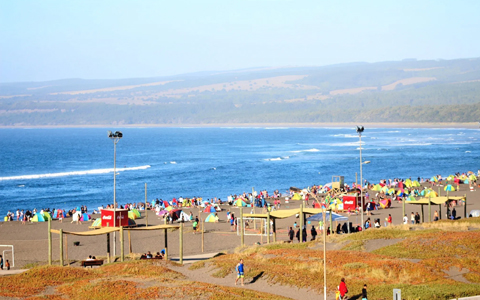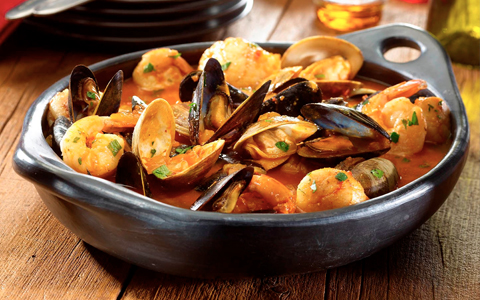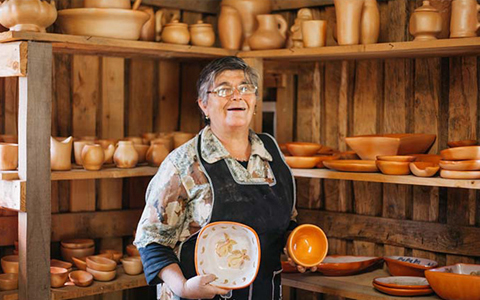BALNEARIO
PICHILEMU: Las palabras... Surf en Pichilemu
El balneario:
Pichilemu se caracteriza por la amplia oferta turística que ofrece en todos los rincones de la comuna, donde hay una perfecta conjunción entre campo y mar. Hermosos paisajes campestres resaltan junto al verde azulado océano que se extiende a lo largo de cien kilómetros con atractivas playas de arenas grises apropiadas en su mayoría para la natación, pesca deportiva y para la práctica de los deportes náuticos, entre los que destaca el surf.
Si bien hoy en día Pichilemu es conocido mundialmente por este deporte, no es menos cierto que una gran cantidad de turistas, año a año se siente atraido por las numerosas actividades y panoramas que se ofrecen en los sectores rurales. En efecto, el turismo campesino ofrece una gran cantidad de alternativas para apreciar, por ejemplo, su artesanía (gredas de El Copao, arcilla de Pañul); su gastronomía a través de los Ranchos Campesinos: San Andrés en Ciruelos, Oro Blanco en Barrancas y El Bronce en La Villa junto al estero Nilahue. En cada uno de estos ranchos podrá degustar deliciosos platos con comida tradicional, como también bebidas típicas.
Características Generales:
La comuna de Pichilemu, capital de la Provincia Cardenal Caro, está constituida principalmente por un centro urbano y 23 localidades rurales. Se ubica a una distancia de 177 kms. de la cabecera regional, ciudad de Rancagua y a 121 kms. al sur oeste de la ciudad de San Fernando. Los límites generales son: la comuna de Litueche por el norte; la comuna de Paredones por el sur y las comunas de Marchigüe y Pumanque por el oriente; y con el Océano Pacífico por el Poniente.
Topografía y Clima:
El principal centro hidrográfico al final del estero Nilahue que nace en la comuna de Paredones, denominada laguna de Cahuil, es de aguas salobres por tener relación directa con las mareas del Océano Pacífico en ciertos períodos del año.
El estero de San Antonio constituye otro curso hidrográfico importante, el cual nace en las partes más altas de la Cordillera de la Costa, en el sector de San Antonio de Petrel, terminando en la laguna Petrel, la que está ubicada próxima al mar en la zona urbana de Pichilemu.
Otros centros hidrográficos destacables son las lagunas El Barro, El Bajel y El Ancho, próximas a la zona donde desde esta última se provee el agua potable para la ciudad. Su ubicación costera hace que su clima se www.relojesasequibles.com caracterice por temperaturas sin variaciones extremas en las diferentes épocas del año. Las temperaturas máximas y mínimas respectivamente son 27,5° y 9° y la media de 13,1°.
Superficie y densidad de la población: La comuna comprende una extensión de 747,3 Kms2, representando el 0,1% de la superficie del país y el 4,6% de la región.
Pichilemu Chile´s gift to you!
Always attractive greets you and extends a most cordial invitation to browse these pages where you will learn of the many diversions offered by our resort and community for a truly memorable vacation.
First, you will be delighted with our beaches directly on the Pacific miles of clean, grey sand in natural, unspoiled areas for sunbathing, swimming, fishing, surfing, and all kinds of water sports, in a totally smog free, unpolluted environment.
But Pichilemu much more than its splendid beaches. The generous Pacific provides delicious, fresh fish and shellfish famous in the area. In a little blue horse-drawn cart you can enjoy the rural landscape and visit picturesque nearby villages. There you will have the opportunity to meet friendly, hospitable people, typical of the CHILEAN countryside, at work in their fields, competing at a colorful rodeo, or their skill at the Cueca, a fast-stepping handkerchief dance.
Also, you will become acquainted with our historic and architectural heritage via the buildings constructed by Agustín Ross Edwards, the original creator of this resort; the of Ciruelos, and the recently created museum of Pichilemu (November of 1997).
Pichilemu boasts a wide variety of places to stay: hotels, cabañas, hostals, motels as well as rooms in private residences in all price ranges.
Numerous restaurants, inns, pubs and eating places await your family where you may sample typical dishes of the area (paila marina to mention but one); or enjoy from a wide selection of cocktails, including the famous vaina and pisco sour.
Day and night, adults and young people will find plenty of recreational activities and amusements, sports, cultural and artistic events, a moonlight ride by the sea. And, of course, discotheques!
After your vacation, we are sure you will carry in your mind and heart happy memories of your stay in our unique community and resort called Pichilemu. From the sea inland, we invite you to discover: History, Architecture, Beachs, waves, salt flats, forests, artisans, picturesque villages.
Coastal landscapes of exceptional beauty.
An invitation to interior peace.
Acquaintance with new horizons that all vacationers are looking for.
Don´t forget Pichilemu forever attractive!
The resort of Pichilemu
Called in the native Araucanian language, PICHI=small, and LEMU=forest, its origins as a resort goes back to 1885 when Mr. Agustín Ross Edwards started construction of his hotel, mansion and park, which still today on Avenue Ross. The community of Pichilemu (population 12,000) is 747.3 Km2 and is comprises of an urban center and 23 rural towns. Located 270 kms. south-west of Santiago, (170 Kms from San Fernando). Pichilemu is Capital of the Cardenal Caro Province (named Chile´s first cardinal) and principal center of tourist activity of the VI (O´Higgins) Region. Transportation into, out and around Pichilemu is exellent. Its coastal location means that we enjoy moderate temperatures year round maximum minimum being: 27.5ºC and 9ºC, (81.5ºF 48.1ºF), with an average of 13.1ºC (55.6ºF). 27.
A walking tour of Pichilemu
1. The Municipal Park Agustín Ross. Donated to the city by the Ross heirs, and made a National Monument in 1988, this lovely park overlooking the principal beach is the perfect place to relax and enjoy the exquisite panorama of the sea. A bit of the Rivera, its many shady palms from the Canary Islands, its manicured lawns and reflecting pools, all add up to one of Pichilemu´s most distinguished treasures.
2. El Bosque (The Wood). Directly opposite the ex-Mansion-Casino, the Wood is path offers a spectacular stroll in the serenity of a double row of palms, which opens into a pine-clad wood. Comprised of some six hectares, tennis enthusiasts can enjoy playing in the recently built court in the peaceful surroundings of this pine and eucalyptus scented area.
3. Ex-Casino-Mansion Building. Our most valuable architectural work from the turn of the century (1906), its style was inspired from the European travels of Sr. Ross and his family. In this mansion, he opened the very first casino in Chile (1917). After his death in 1926, the place deteriorated over the years until purchased by the Municipality in 1997, and is gradually being restored. One wing, Sala AgustÍn Ross, newly refurbished, functions as a center for important cultural events.
4. Cave of the Virgin of Lourdes. On the far side of the Parque Ross, under the stairway leading to the beach, There is a natural rock cave approximately 2 meters high and wide. Here, in 1908 were found the remains of early natives of the area, as well as arrowheads, hand-axes, fish hooks and bits of pottery. In 1950, a statue to the virgin was erected, creating a natural chapel, where, among candlelight and flowers, visitors and citizens alike may find the solitude necessary for meditation.
5. Ex-Estación de Ferrocarriles (Ex-Train Station). Located at the base of the hill leading to Pichilemu center, this wooden structure dates from 1925, the arrival of first trains from Santiago. Its design typical of the epoch, the station was declared a National Monument in 1994, and is now a center of culture and art. An exhibit of antique photographs from the early days of Pichilemu is often featured.
6. Plaza Arturo Prat. (Arturo Prat Square). This lovely, verdant plaza, (Avenida Ortúzar and Federico Errázuriz), overlooking the extensive Pacific, is named in honor of Chile´s first admiral of the Navy (also by the Treasury on the 10,000 bill). A principal center for outdoor concerts, art and theatre events, it was created in 1970 and boasts many species of plants and trees, such as araucarias, oriental bananos, and laurel the ideal place for pictures and viewing Pichilemu´s spectacular sunsets!.
Neighboring villages of special interest
1. Cáhuil. Named after a small bird of the area, this village is 13 Kms South of Pichilemu. A small, attractive resort with several restaurants, its microclimate is ideal for the cultivation of papayas and garden products. An interesting feature is the salines just below the town. A ferry carries passengers and vehicles to the other side of the lake.
2. Barrancas and La Villa. Two small villages settled for generations by workers of the salt flats and farmers of the Cáhuil area. Located on the banks of the Nilahue estuary and flanked by salt works of the area.
La Plaza. Located 8 Kms south of Cáhuil from the intersection at La Villa, this village has a white sand beach with warm, tranquil waters, a great picnic spot for relaxing, swimming and family recreation.
3. Ciruelos (The Plums). A very old village 13 Kms. to the interior, featuring artisans in pottery. Its cemetery and church are the oldest of the region, the patron saint being the apostle San Andrés (Saint Andrew) . The small Museum has a most interesting collection of artifacts. Continuing a bit further are El Copao and Pañul, also known for their pottery, pine forest and country farms a most interesting excursion.
Beaches and Lagoons
On the coastal road between Pichilemu and Cáhuil (13 kms), are many beaches for fishing, water sports, swimming and surfing.
1. Playa Principal San Antonio. La Puntilla (The Point). Located in front of the Terraces and the Parque Ross, this is a wide beach equipped with showers, baths, dressing rooms and parking. Popular swimming beach and excellent surfing conditions.
2. Playa Infiernillo (Little Hell). A rocky stretch South of the main beach, another area for fishing and water sports. This walk is a must for sunset viewing.
3. Playa Punta de Lobos(Sea Lion or Lobo Beach). An extensive beach for fishing and swimming-- in the same area as Playa Hermosa, characterized by its cliffs and its two huge rocks (once the hangout of sea lions) which can be seen for miles. The beach is known internationally for its excellent surfing conditions.
4. Laguna de los Curas. 6.5 Kms. South of Pichilemu a small fresh water lagoon especially good for fishing.
5. Laguna del Perro (Lagoon of the dog). 7 Kms. South, in same area, for fishing and water sports.
6. Laguna de Cáhuil. Located 13 Kms. South, a popular place for fishing, swimming and boating.
7. Playa Hermosa (Beautiful Beach). Halfway between Pichilemu and Cáhuil a preferred spot for fishing and water sports. Principal Beaches for Surfing
Owing to its excellent wind and wave conditions, Pichilemu is considered the best place in Chile for surfing. From all over the world Australia, Hawaii, California, Brazil, surfers come to test their skill in our challenging waters. Frequently the scene of surfing competitions, these beaches are especially used and recommended by the Surf Club.
1. La Puntilla (The Point). Black sand beach. Waves average 1.5 mtrs. Distance covered: 600m (Wave) Water temp:13ºC (55ºF). Board - 6.8" . Suit 4.3mm . Few Surfers in area. Waves all year. Left Wave. Sandy bottom.emp:
2. Infiernillo (Little Hell). Black sand beach. Waves average 2.0 mtrs. Distance covered: 300 mtrs (Wave) Wave-Left. Board - 6.10" recom. Few Surfers. Waves year roud. Rocky bottom.
3. Punta de Lobos. (Sea Wolf Beach). 6 kms south of Pichilemu. Extensive beach for fishing and swimming. Known world-wide for its excellent surfing conditions. Black sand beach. Waves average 1.5 mtrs. Distance covered: 300-350 mtrs. Wave: Left/right. Board: 6.10" recom. Few Surfers. Bottom: Sandy/rocky.
4. La Pancora. Black sand beach waves average 1.5 mtrs. Distance covered: 300-350 mtrs. Wave: Left/right Board: 6.10". Few Surfers. Bottom: Sandy/rocky.




